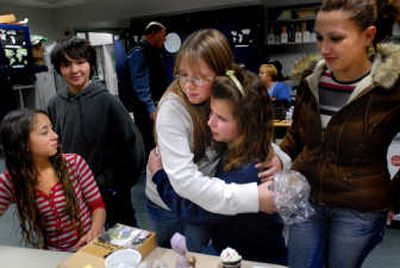Albanian girl heals in Spokane

Merita Ulaj didn’t cry when surgeons at Shriner’s Hospital for Children in Spokane operated on her arm to realign the bones in her elbow. The 12-year-old Albanian girl didn’t shed any tears during more than $2,800 in dental work, nor when doctors repaired damage to her eardrums.
But on Monday, Ulaj couldn’t stop the tears as she said goodbye to her friends and teachers at Stevens Elementary School. Early today Ulaj, who came to America four months ago to receive medical treatment, will head back to her family in Boga, an alpine village in northern Albania.
Students in Dan Krotzer’s sixth-grade class at the northeast Spokane school showered the girl with notes and pictures to take back to her country, so she won’t forget them.
“We are going to miss you bad,” 11-year-old Tyshon Duke wrote in a note to Ulaj, who speaks some English.
But Ulaj is unlikely to forget her experience here. She came to Spokane in July, with the help of Marvel Nichols, a Spokane woman who has spent time volunteering in the mountain villages of Albania.
Nichols’ cousin and Oregon State University professor Steve Cook is the founder of the Albanian Alps Institute, a nonprofit organization dedicated to helping children further their education. Nichols met Ulaj when she went to Boga to teach gymnastics and English to the children in the village.
“I can’t imagine saying goodbye to her in the morning,” Nichols said Monday. “To have a child that has been through so much, but always smiles is like, oh my gosh.”
Ulaj had broken her arm when she was 6, and the bone was set improperly and atrophied, healing at a frozen right angle to her body. She also had profound hearing loss – doctors in Spokane discovered that her ear drums had been destroyed, likely from untreated infections, and she needed dental work.
Nichols worked for 10 months, making arrangements for treatment through Shriner’s and other organizations, raising funds to help pay for expenses for both Ulaj and her 23-year-old translator, Genta Hysaj.
Initially, the U.S. Embassy in Albania denied nonimmigrant visas for the pair, stating there was not enough evidence to prove they would return to Albania after the surgeries. They were turned away when Hysaj did not know the exact number of cows Ulaj’s family owned, a way to prove economic ties to the country.
Hysaj spent most of July traveling back and forth between the town of Shkoder, where she attended college and now works as a translator, and the village in the mountains to gather documents for Ulaj.
On the second try, the visas were approved. Ulaj and Hysaj have been staying with Nichols in her home on Pacific Avenue.
When Ulaj wasn’t undergoing treatments, she’s been attending school, learning English through the district’s language program.
“It’s been real neat to have her in class,” Krotzer said. Ulaj has had the opportunity to talk to students about her life in Albania. Her village has no running water or toilets, for example, and sometimes no electricity.
Through a translator, Ulaj said she will miss her friends at school, and probably some modern conveniences. She recently went to get a manicure, her fingernails still painted bright pink. She’s gained 22 pounds and grown an inch and a quarter.
“Our kids don’t always get to see how other countries live,” Krotzer said. “It’s been wonderful.”